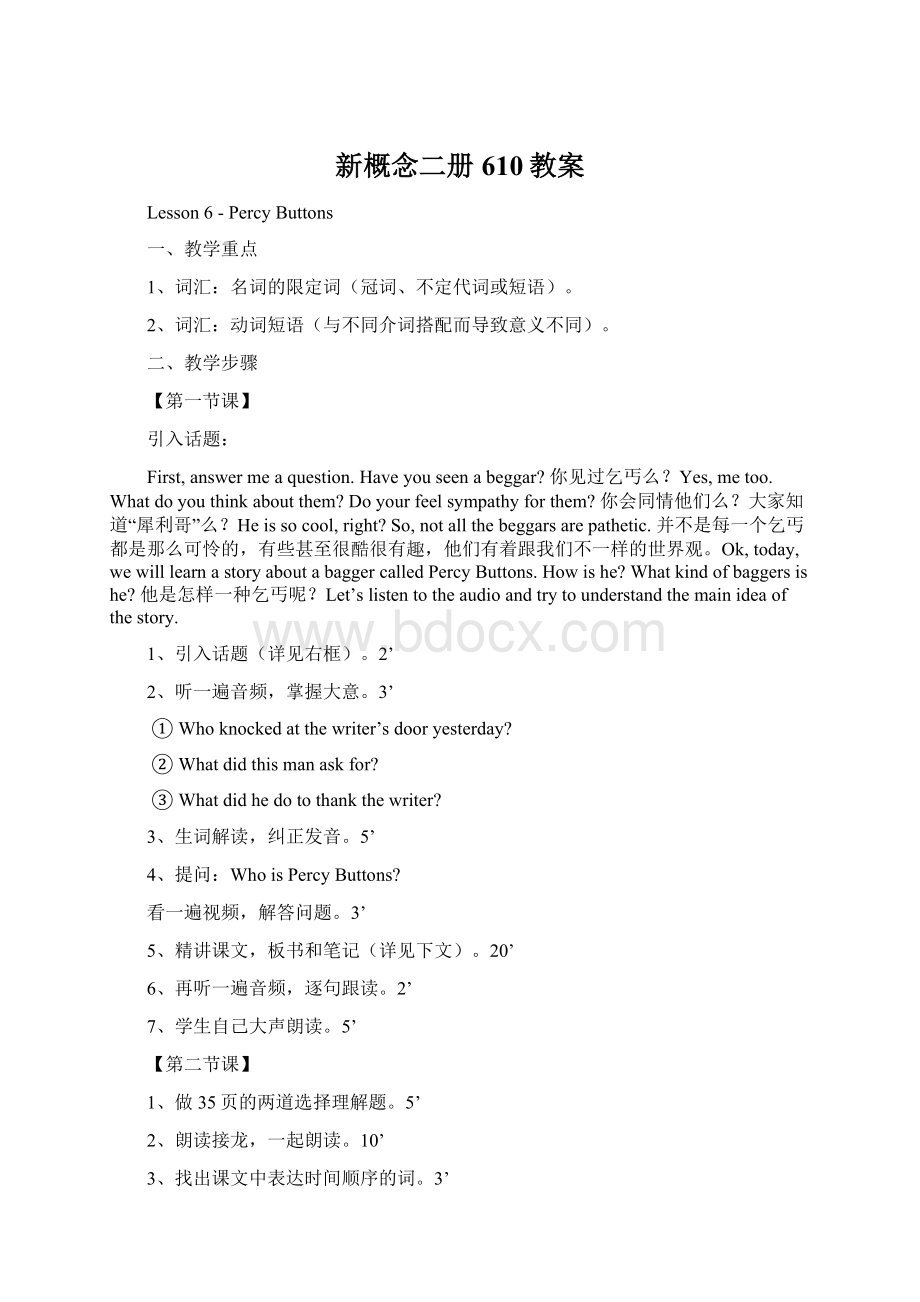新概念二册610教案.docx
《新概念二册610教案.docx》由会员分享,可在线阅读,更多相关《新概念二册610教案.docx(18页珍藏版)》请在冰豆网上搜索。

新概念二册610教案
Lesson6-PercyButtons
一、教学重点
1、词汇:
名词的限定词(冠词、不定代词或短语)。
2、词汇:
动词短语(与不同介词搭配而导致意义不同)。
二、教学步骤
【第一节课】
引入话题:
First,answermeaquestion.Haveyouseenabeggar?
你见过乞丐么?
Yes,metoo.Whatdoyouthinkaboutthem?
Doyourfeelsympathyforthem?
你会同情他们么?
大家知道“犀利哥”么?
Heissocool,right?
So,notallthebeggarsarepathetic.并不是每一个乞丐都是那么可怜的,有些甚至很酷很有趣,他们有着跟我们不一样的世界观。
Ok,today,wewilllearnastoryaboutabaggercalledPercyButtons.Howishe?
Whatkindofbaggersishe?
他是怎样一种乞丐呢?
Let’slistentotheaudioandtrytounderstandthemainideaofthestory.
1、引入话题(详见右框)。
2’
2、听一遍音频,掌握大意。
3’
①Whoknockedatthewriter’sdooryesterday?
②Whatdidthismanaskfor?
③Whatdidhedotothankthewriter?
3、生词解读,纠正发音。
5’
4、提问:
WhoisPercyButtons?
看一遍视频,解答问题。
3’
5、精讲课文,板书和笔记(详见下文)。
20’
6、再听一遍音频,逐句跟读。
2’
7、学生自己大声朗读。
5’
【第二节课】
1、做35页的两道选择理解题。
5’
2、朗读接龙,一起朗读。
10’
3、找出课文中表达时间顺序的词。
3’
4、表示数量的不定代词或短语(详见下文)。
10’
5、做33页的练习题。
10’
6、做34页的造句练习。
5’
7、读绕口令游戏。
7’
【第三节课】
1、难点:
34页的动词短语。
15’
2、听写单词,记忆法指点。
5’
3、听一首英文歌曲。
8’
4、看图背课文比赛。
20’
5、总结本课重点,让学生标注(详见上文)。
1’
6、布置作业:
摘要写作,35页的选择题,背课文和单词。
1’
三、精讲课文
1、moveto移动→搬家。
例句:
Myuncle’sfamilywillmovetoAmericanextweek.
2、beggar乞丐→beg:
乞求。
begfor>askfor【回顾】Ibegyourpardon?
3、knockatone’sdoor敲某人的门。
动词:
Thereissomeoneknockingatmydoor.
名词:
Didyouheartheknockatthedoor?
knock是不及物动词,可与下列介词连用表示不同含义,详见34页练习。
4、asksb.forsth.向某人要某物。
例句:
Youcanaskhimforhelp.
4、inreturnfor...作为对…的回报(介词短语)=(不定式)toreturnthefavour
例句:
Iwillgiveyouonethousandinreturnforyourhelp.
5、standonone’shead倒立,拿大顶。
例句:
-Canyoustandonyourhead?
standonone’shands用手撑地。
例句:
-No,butIcanstandonmyhands.
(stand)onone’sknees跪下。
lieonone’sback仰面躺着。
6、givesb.sth.=givesth.tosb.双宾语【回顾Lesson3】。
7、put...in/into...把…放进…里。
反义:
take...outof...把…从…里拿出来
8、tellsb.aboutsth.告诉某人关于某事。
例句:
Canyoutellmesomethingaboutyourfamily?
9、Everybodyknowshim.每一个人都知道他。
every强调大家都,但谓语动词要用单数。
11、callsb.=ringsb.=callsb.up=ringsb.up给某人打电话。
例句:
Iwillcallyou.
callonsb.拜访(某人)。
例句:
Iwillcallonyou.
callat=callin拜访,光顾(某人家)。
例句:
Iwillcallat/inyourhome.
callby(at)顺便光顾(某地)。
例句:
Iwillcallbyattheshopsonmywayhome.
12、inthestreet[英]=onthestreet[美]
13、onceamonth每月一次。
扩展:
twiceamonth,onceeverytwomonths,threeweeksaweek
注意a/an的用法:
seventy-fivebeatsaminute,fivekilometersanhour
四、总结与练习
1、文化背景:
学完这篇课文,大家对乞丐的印象是不是多少有些改变呢?
课文中的这个乞丐挺招人喜欢的,他用自己的绝活来换取食物。
绝活、杂技:
stunt。
他们见到你,或许会说:
Sparesomechange.给些零钱吧。
关于乞丐,还有一句英国谚语:
Baggerscan’tbechoosers.乞丐没的选择。
其实呢,如果你去西方国家旅游,经常能看到在街头卖艺的人,这些人有些确实是生活比较困难的,但是还有一些仅仅是在自娱自乐,甚至是学艺术的学生。
他们有着不太一样的生活观念。
2、表达时间顺序的词:
①then然后,接着。
文中:
Thenheputapieceofcheeseinhispocketandwentaway.
②later后来,过会儿之后。
文中:
Lateraneighbourtoldmeabouthim.
3、表示数量的不定代词或短语:
(1)用在可数名词前的:
①a/an:
ameal,anapple
②some:
somebooks,somemen
③afew:
afewwords,afewwomen
④many:
manypictures,manychildren
⑤agreatmany:
agreatmanyplaces
⑥agreatnumberof:
agreatnumberofstudents
⑦alotof=lotsof:
alotofpeople,lotsofthings
(2)用在不可数名词前:
①绝对不能用a/an,但是可以用the
②some:
somemeat
③alittle:
alittlemoney
④much:
muchinformation
⑤agreatdealof:
agreatdealoffood
⑥agreatamountof:
agreatamountofrain
⑦alotof:
alotofwater
⑧aglassofbeer,apieceofcheese,twobagsofflour,abarofsoap,acupoftea,asetoffurniture
Lesson7-Toolate
一、教学重点
1、时态:
过去进行时。
2、词汇:
介词的用法。
二、教学步骤
【第一节课】
1、引入话题(详见右框)。
2’
2、听一遍音频,掌握大意。
5’
①Whyweredetectiveswaitingattheairport?
②Wheredidtwomentaketheparcelafterthearrivaloftheplane?
③Whatdiddetectivesfindintheparcel?
引入话题:
Todaywewilllearnastoryaboutdiamonds.今天的小故事是关于钻石的。
Butthere’ssomethingwrongaboutthem.但是在这些钻石身上发生了一些不寻常的事。
Whathappened?
到底发生了什么事呢?
Let’slistentotheaudioandtrytounderstandthemainideaofthestory.
3、生词解读,纠正发音。
10’
4、提问:
Didthedetectivesavethediamonds?
看一遍视频,解答问题。
3’
5、精讲课文,板书和笔记(详见下文)。
20’
【第二节课】
1、再听一遍音频,逐句跟读。
5’
2、朗读课文。
10’
3、做39页的两道选择理解题。
5’
4、找出课文中的过去进行时。
5’
5、做37页的练习。
15’
6、听一首英文歌曲。
10’
【第三节课】
1、分析课文中介词的用法。
8’
2、讲解38页的难点:
动词短语中介词的位置。
10’
3、听写单词,记忆法指点。
10’
4、看图背课文比赛。
20’
5、总结本课重点,让学生标注(详见上文)。
1’
6、布置作业:
摘要写作,39页的选择题,背课文和单词。
1’
三、精讲课文
1、Detectiveswerewaitingattheairportall(the)morning.
这里detectives第一次出现,且只是强调“侦探”这类人,所以可以不用冠词。
过去进行时(强调过去某段时间一直在做某事),标志性时间状语allthetime/day/morning
waitforsb./sth.atsomewhere;at+小地点,in+大地点
2、TheywereexpectingavaluableparcelofdiamondsfromSouthAfrica.
expectsth.(心理上的期待)=waitforsth.(动作上的期待)。
expectsb.todosth.
注意expectVSexcept。
valuable贵重的VSprecious珍贵的
aparcelof...一包…diamond(jade,crystal)戴梦得珠宝
3、Afewhoursearlier,someonehadtoldthepolicethatthieveswouldtrytostealthediamonds.
立足点是侦探们等在机场的时间。
主句用的过去完成时,从句用的过去将来时。
someone不定代词。
trytodosth.试图做某事。
afewhoursago现在之前,以现在的时间为基点往前推,用于一般过去时。
afewhoursearlier比之前更早,以过去的时间为基点往前推,用于过去完成时。
4、Whentheplanearrived(分句2),someofthedetectiveswerewaitinginsidethemainbuildingwhileotherswerewaitingontheairfield(分句1).
主句是过去进行时,分句1是过去进行时,分句2是一般过去时。
while后常接进行时(持续性动词)。
when后常接一般时(瞬时性动词),也可接进行时(持续性动词)。
5、Whiletwodetectiveswerekeepingguardatthedoor,twoothersopenedtheparcel.
例句:
Myfatherisreadingnewspaperswhilemymotheriscooking.
Myfatherwasreadingnewspaperswhenthetelephonerang.
注意:
这两个动作同时发生(atthesametime),但主句动作是想要强调的动作。
while还有另外一种用法,表示转折:
例句:
Heishard-workingwhilehisbrotherislazy.(while=whereas)
6、TwomentooktheparcelofftheplaneandcarrieditintotheCustomsHouse.
这里的off有“离开…”之意,而且一般是方向向下。
例句:
Hekickedthesnowoffhisshoes.Shetookthepaintingoffthewall.
theCustomsHouse=theCustoms海关。
(不要漏掉s)VS戏装,服装costume
carry...(from...)to/into...把某物从某地带往某地
7、Totheirsurprise,thepreciousparcelwasfullofstonesandsand!
toone’ssurprise令某人吃惊的是。
固定表达方式。
扩展:
toone’sdisappointment
precious=veryvaluable非常珍贵的。
befullof=befilledwith装满了…
stone可数,sand不可数。
agrainofsand一粒沙子,apileofsand一堆沙子。
四、总结与练习
1、文化背景:
这个小故事中,侦探保住了钻石么?
没有。
看来小偷们很狡猾(cunning)。
你认为这个故事背后到底有什么呢?
请随便说。
也许是瞒天过海、偷梁换柱、暗度陈仓,也许根本就是个骗局(hoax),是有人想跟侦探们开个玩笑(playajoke)。
2、复合句中一般时VS进行时,及连词when、while、as的用法:
①两个动作同时发生,被强调的动作放在主句中,另一个放在从句中。
②when+瞬时性动词(一般时)/持续性动词(进行时)
while+持续性动词(进行时)
as+瞬时性动词(进行时)
Lesson8-Thebestandtheworst
一、教学重点
1、词汇:
形容词和副词的比较级和最高级。
2、词汇:
跟every相关的复合不定代词。
二、教学步骤
引入话题:
Doyouhaveagarden?
Haveyouseengardens?
Doyoulikegardens?
Today,wewilllearnastoryaboutagardencompetition.今天我们来讲一个关于园艺比赛的小故事。
Let’slistentotheaudioandtrytounderstandthemainideaofthestory.
【第一节课】
1、引入话题(详见右框)。
2’
2、听一遍音频,掌握大意。
3’
①HowisJoe’sgarden?
②Whoelsehasafinegarden?
③Whatprizedoesthewriteralwayswin?
3、生词解读,纠正发音。
5’
4、提问:
WhyisJoe’sgardenthemostbeautifuloneinthetown?
看一遍视频,解答问题。
3’
5、精讲课文,板书和笔记(详见下文)。
20’
6、再听一遍音频,逐句跟读。
2’
7、学生自己大声朗读。
5’
【第二节课】
1、做43页的两道选择理解题。
5’
2、朗读课文。
10’
3、找出课文中的比较级和最高级。
5’
4、详细讲解形容词和副词的比较级和最高级(详见下文)。
10’
5、做41页的练习。
15’
6、听一首英文歌曲。
5’
【第三节课】
1、跟every相关的复合不定代词。
5’
2、做42页的练习。
10’
3、听写单词,记忆法指点。
5’
4、读绕口令游戏。
8’
5、看图背课文比赛。
20’
6、总结本课重点,让学生标注(详见上文)。
1’
7、布置作业:
摘要写作,43页的选择题,背课文和单词。
1’
三、精讲课文
1、JoeSandershasthemostbeautifulgardeninourtown.
beautiful-morebeautiful-themostbeautiful;【多音节词】【the+形容词的最高级】
2、Nearlyeverybodyentersfor'TheNicestGardenCompetition'eachyear,butJoewinseverytime.
nice-nicer-thenicest;【单音节词】【the+形容词的最高级】
nearly=almost几乎。
everybody看作三单。
each=every每一个。
everytime每次。
enterfor报名参加。
例句:
Heenteredformarathonlastyear.She’llenterforabeautycontest.
3、BillFrith'sgardenislargerthanJoe's(garden).
large-larger-thelargest;【单音节词】【形容词的比较级+than】
4、BillworksharderthanJoeandgrowsmoreflowersandvegetables,butJoe'sgardenismoreinteresting.
hard-harder-hardest;【单音节词】【副词的比较级+than】
many-more-themost;【不规则变化】【形容词的比较级】
interesting-moreinteresting-themostinteresting;【多音节词】【形容词的比较级】
grow种植,培育(及物动词)。
例:
growplants,growrice
grow生长,成长(不及物动词)。
例:
Theflowersgrowwell.Hehasgrownup.
5、Hehasmadeneatpathsandhasbuiltawoodenbridgeoverapool.
neat=tidyVSclean;pathVSroad;woodenVSgolden;poolVSLiverpool
over在…上面,横跨…(aboveandacrossfromonesidetotheother)
例句:
Hejumpedovertheriver.Thebirdflewoverthefield.
6、Ilikegardenstoo,butIdonotlikehardwork.
这里的hard是个形容词。
work是不可数名词。
hardwork[n.]VSworkhard[v.]VShard-working[adj.]
7、EveryyearIenterforthegardencompetitiontoo,andIalwayswinalittleprizefortheworstgardeninthetown!
win+比赛/奖品:
winthegame,winaprize(for...)
beat/defeat+对手:
Ibeatyou.TheRocketdefeatedtheLakers.
bad-worse-theworst;【不规则变化】【形容词的最高级】
little小的,微不足道的。
例句:
alittlepresent
四、总结与练习
1、文化背景:
在英美许多国家,花园是居住品质的重要部分,前花园(frontgarden),后花园(backgarden)。
很多西方人都很喜欢园艺(theartofgardening),在花园里喝下午茶(afternoontea),或者开个派对(haveagardenparty)。
2、形容词和副词的比较级和最高级:
★概念:
比较级用于两者作比较;最高级用于三者或三者以上作比较(通常有范围of/in)。
★变化规则:
(1)规则变化:
形容词和副词的变化规则相似,只是形容词最高级前一般加the而副词不用。
①一般情况+er/est:
hard-harder-hardest,nice-nicer-nicest
②以一个辅音字母结尾的重读闭音节,双写该辅音字母+er/est:
big-bigger-biggest
③以辅音字母+y结尾的,y→i+er/est:
lazy-lazier-laziest,heavy-heavier-heaviest
④多音节及某些双音节词,+more/most:
difficult-moredifficult-mostdifficult,tired-moretired-mosttired
(2)不规则变化:
(好坏、多少、远老)
good/well-better-best,bad/ill/badly-worse-worst,many/much-more-most,few/little-less-least
far-farther/further-farthest/furthest,old-older/elder-oldest/eldest
★固定句型:
(1)形容词
①原级:
Heisastallasme.
Heisnotas/sotallasme.
②比较级:
Heistallerthanme.
Heisthetallerofthetwoboys.
Ourcountryisgettingstrongerandstronger.
Themore,thebetter.
Themoredifficulttheproblemis,themorecarefulweshouldbe.
③最高级:
Heisthetallestofthethreeboys.=He